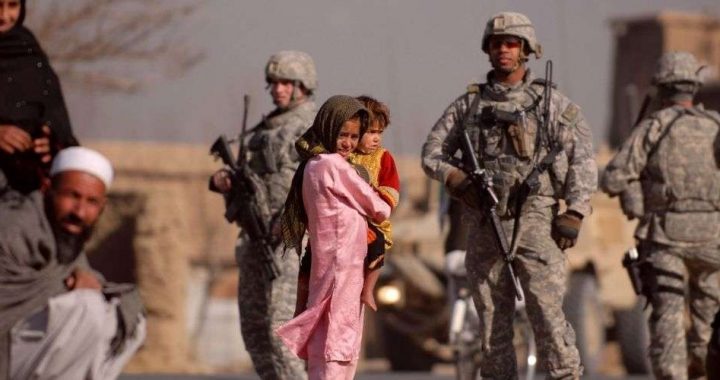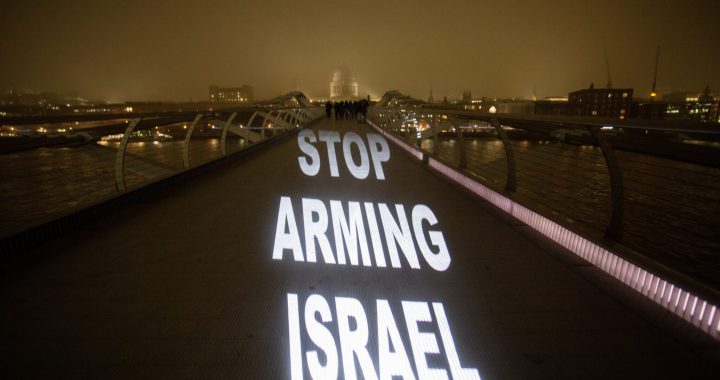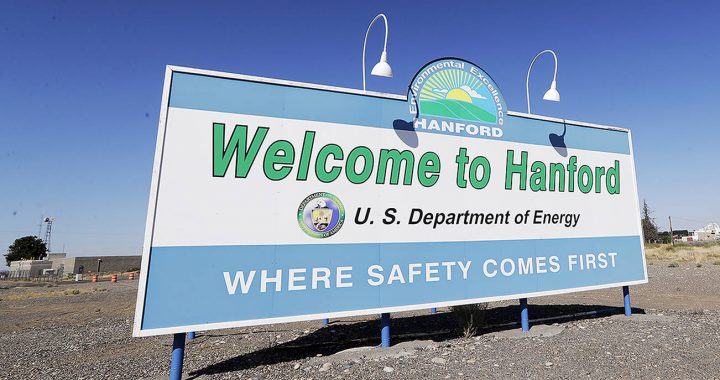Reporter Martha Baskin conducted an interview with Kathy Kelly, of Voices For Creative Nonviolence, at Ground Zero Center for Nonviolent Action on Mothers Day Weekend, Saturday, May 14, 2019. Baskin had planned to write a short article after hearing Kelly’s keynote address at Ground Zero, titled “Deploying Love in a Permanent Warfare State,” but long ferry lines from Seattle cause her to miss it. Baskin caught up with Kelly before she and other activists left to walk to the Bangor Trident nuclear submarine base where Kelly and seven others engaged in a nonviolent direct action blocking the roadway into the base. The interview has been edited for clarity.
Baskin: “Deploying Love in a Permanent Warfare State” sounds ephemeral and almost other worldly, especially when the US has been involved in multiple wars and civil conflicts since Vietnam: the Gulf War, Afghanistan, Iraq, Somalia, Libya, Syria, Yemen, to name a few. What do you mean by “deploying love”?
Kelly: In a permanent warfare state the crucial step of education goes missing. I think democracy is based on education. Since I arrived at Ground Zero I’ve heard people say that several times in several contexts. Unfortunately the military has a vice-like grip on many means of educating the public: whether it’s media literacy, on college campuses or entertainment. As a result it depends on people – good souls who come to gatherings like this – to inform the public. In looking over my own years, I’m 66 years old, it’s remarkable to me that so much energy has been invoked to stop wars, given the efforts of highly paid think tanks and media outlets to prevent that education. Many are very troubled by the ongoing war in Yemen with more momentum than we’ve seen in quite some time to stop the arming of Saudi Arabia {Kelly refers in part to a Senate resolution that passed 54-46 in March 2019 to end US support for the Saudi-led coalition fighting in Yemen.}
But one very shrouded reality remains the ballistic missile test launches. Last week the US launched an intercontinental ballistic missile (ICBM) test from California’s Vandenberg Air Force Base toward the Kwajalein Atoll in the Marshall Islands. The launch received little attention but occurred on the same day North Korea ended a 522-day halt to such activity with its first missile launch test since 2017. Do people know about that or do people recognize that we really can’t have a rational discussion about solving our very real social problems – climate catastrophe , mass incarceration, immigration – unless we tackle the 750-billion-dollar military budget?
Baskin: While Trump’s predecessors were by no means pacifists, Trump and his advisers, notably John Bolton and Mike Pompeo, appear poised for a number of new military actions against Iran, Venezuela and Cuba. What does “deploying love” look like here?
Kelly: I wouldn’t give money to the mafia if they came to my door and said, “Excuse me Ms. Kelly, we’d like a third of your income.” I just wouldn’t do it. I think we should love our neighbors, and many people are inspired by the idea of loving enemies; if you care about people getting enough to feed their children or being able to cope with serious diseases and if you care about Mother Earth here on Mother’s Day then we aren’t going to pour our resources into the bottomless hole of military spending. The spending is unloving; it’s cruel and destructive and could result in something calamitous in our time, and I’m talking about nuclear omnicide.
Baskin: You deploy love by not paying federal taxes, which you haven’t paid since 1980. That in and of itself is a very concrete act of love in opposition to the way the US spends its federal discretionary dollars. {Editor’s note: In fiscal year 2015, military spending accounted for 54% of all federal discretionary spending, a total of $598.5 billion. In 2018 the total was $700 billion.} Is refusing to pay federal taxes something you encourage others to take?
Kelly: Truthfully no. The IRS is my spiritual director. It works for me. I don’t want a car or a home to take care of. So it’s worked for me. Instead I’ve lived in community and had a very good life. But the IRS will catch up with people. Unless you’re sure you’ll never pay or have made arrangements to ensure that you’re as reasonably free from collection as possible I wouldn’t encourage it. On the other hand, if you reach a point where you think, “I can’t live my life and continue to support the war makers”, then I think it’s a good idea to consult with a war-tax resistance counselor. Maybe you can resist and not necessarily refuse all the taxes.
But I think there’s also the question of, “are we in community learning to live more simply?”, and here I stand condemned since I flew out here to Ground Zero. I read about Extinction Rebellion, and my heart wants to break, and I think, “why am I flying another plane?” There wouldn’t be a housing shortage if we put our minds to figuring out how to share resources more radically, share jobs, share income, share transportation and engage in service rather than dominance. My hope is that a younger generation will pick up on those realities because it might mean survival. But we all can do as much as possible to communicate to younger generations those possibilities.
Baskin: And is that part of closing the circle, and another act of “deploying love”?
Kelly: I think love goes together with courage and wisdom, if we’re going to find a different kind of living. We don’t need wisdom without courage and love. And we don’t need courage without wisdom and love; we need all three. And when people can blend all three – and it takes a long time using life circumstances as the laboratory – when we can encourage one another to control our fears, then I think we can begin to create the kinds of communities that the Ground Zero Center for Nonviolent Action represents.
Baskin: Was there anything else at the heart of the message in your keynote address?
Kelly: Yes. I also wanted to say that where you stand determines what you see. And sometimes we don’t see the consequences of our wars. When I’ve stood in a war zone I’ve learned what I otherwise could not have learned. When I’ve been imprisoned I know I’m going to get out and will have a short sentence and won’t have anything like the stigma of many of the women I meet. But at least then I begin to sense what an onerous reality it is for people to be sentenced to 8, 10, or 25 years in a merciless system of mass incarceration.
So I wanted to say that we can’t stand in Yemen right now but we still have a duty to learn from villagers who bear the brunt of war when we support Saudi Arabia, and really hear when Save the Children says 85,700 children have already died in Yemen from disease and starvation caused by our wars. I often tell the story of a time when I was on top of a nuclear missile silo site. I was kind of shaky and a soldier had a gun pointed in my direction and I suppose I got a little emboldened. It was just him and me. His colleagues had gone off to see what they were supposed to do next I think. So I asked him, “do you think the corn will grow?” And he said, “I don’t know ma’am, but I sure hope so.” And I asked him if he’d like to say a prayer. “Yes, ma’am.” So I said a prayer and he said, “amen.” And then he asked me, “ma’am, would you like a drink of water” and I said, “oh yes, please.” And then he said, “please tip your head back ma’am,” and then he poured the water down my throat from his canteen with both hands. I don’t know what he did with his gun. But his job was to protect that weapon and maintain the nuclear arsenal and instead he chose to give me water. What if we could say to the children in Yemen facing another epidemic of cholera and starvation; what if we could say we care so much more about your survival than about our weapons. Or if we could say to children in Flint, Michigan we’d rather give you clean, not lead-poisoned, water and retire these [nuclear] weapons.
Baskin: What lessons have you learned, Kathy, that apply now with Ground Zero working to retire Bangor’s Trident subs or those trying to stop the war in Yemen or one being waged against Iran?
Kelly: Very recently young friends in Afghanistan told me about brothers and cousins who’ve joined the Afghanistan National Security Defense Forces in order to feed their families. There are few jobs and they want livelihoods. In 2016 and 2017 many rounds of bullets sold or delivered to Afghanistan were fired at the enemy. There were lots of bullets fired but no dead Taliban. So investigators started compiling statistics and it looked like the Afghan soldiers and police were firing the bullets into the air and collecting the casings of the spent shells, which have copper and other metals, and selling them to scrap metal shops for extra income they needed to feed their families. Well I think that’s great. They didn’t kill others. They fed their families. I’m sure many casings remain in the ground and it’s bad for the environment, but then I learned that in 2018 the US sold $125 million worth of bullets to Afghanistan. That’s very troubling. It’s like we’re pushing them. You’ve got to buy these bullets. You’ve got to use these bullets and kill other people with bullets. We’re so complicit in pushing people into using our weapons and into war. The message I’ve always gotten from the Afghan people and those in Iraq is they don’t want the US to come into their country and turn it into a war zone.
Baskin: If Voices For Creative Nonviolence could sit down with the Pentagon what would the message be to them today, in this year 2019?
Kelly: I would say we need their discipline and their acute awareness of conditions in the world to deal with the greatest terror we all face: the terror of what we’re doing to our own environment. We could be harvesting far more wind energy. We could be retrofitting housing stock across the US and building high speed bullet trains. This is the kind of thing that would make the US a more survivable place and also temper antagonism toward the US. Cuba is loved all over the world because they send doctors into precarious situations and the doctors stay for a decade. Well we could be beloved all over the world. We could eradicate diseases, overcome poverty, but we can’t do it and still maintain a permanent warfare state. There’s no rational discussion of resolving our problems if we don’t dismantle our military might. And that could be a sign of great bravery on the part of the Pentagon. Now will they ever try it. We all thought we’d come close with Obama or we came close before the war against Iraq. People came close in WW I before it started so that closeness should be so desirable we can taste it.
Editor’s Note: Please check out Voices For Creative Nonviolence to learn more about its long-standing, creative, nonviolent resistance to U.S. war-making.




